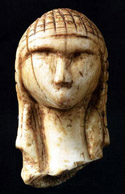Anthropology, Department of

Department of Anthropology: Faculty Publications
Document Type
Article
Date of this Version
1988
Citation
Hames, Raymond. 1988. The Allocation of Parental Care among the Ye'kwana. In Human Reproductive Behaviour, edited by L. Betzig, M. Borgerhoff Mulder and P. Turke. Cambridge: Cambridge University Press.
Abstract
It is well known that human children require more care or parental investment than any other primate species (Lancaster and Lancaster 1983). While this dimension of human behavior is well documented in the psychological literature for Euroamerican populations (Babchuck et al. 1985), it has received scant, quantitative attention by anthropologists working among tribal populations (for exceptions see Whiting and Whiting 1975, Katz and Konner 1981, Hurtado et al. 1985, Hewlett, this volume (Chapter 16), Turke, this volume (Chapter 10)). The role of alloparental care (care of non-offspring children) has received even less quantitative attention by social scientists (for a review see Weisner and Gallimore 1977) although it has been a growing theoretical concern of evolutionary biologists (Skutch 1961, Brown 1978, Reidman 1982, Emlen 1984). The primary goal of this chapter is to describe the allocation of direct care to infants by sub-adults and adults among the Ye'kwana and to show that the degree to which an individual engages in caregiving correlates with options an individual has for enhancing his or her inclusive fitness.


Comments
Copyright 1988 Cambridge University Press. Used by permission.